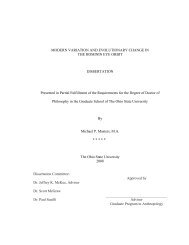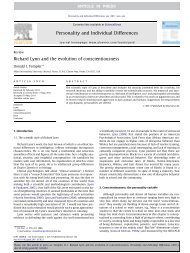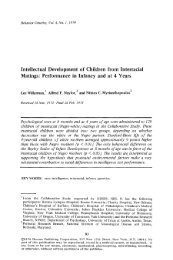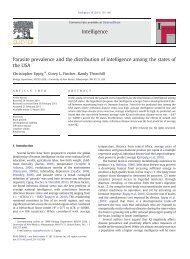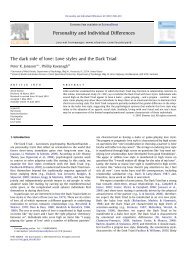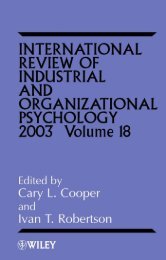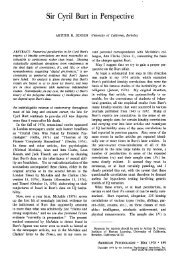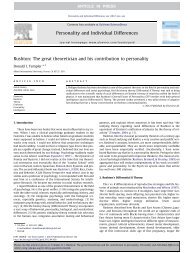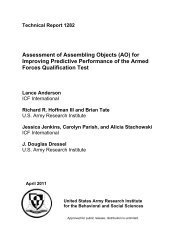Mindâculture interactions: How writing molds ... - ResearchGate
Mindâculture interactions: How writing molds ... - ResearchGate
Mindâculture interactions: How writing molds ... - ResearchGate
You also want an ePaper? Increase the reach of your titles
YUMPU automatically turns print PDFs into web optimized ePapers that Google loves.
14 S. Kazi et al. / Intelligence xxx (2012) xxx–xxxlack of full equivalence in learning experiences other than the<strong>writing</strong> system, we attempt below to advance a comprehensiveexplanatory model for our findings.Overall, the similarities in attainment and organizationemerged as a very powerful finding of this study. We take thesesimilarities to suggest the operation of a common baseline inthe development and the organization of the developing mindthat was the same in both cultures. <strong>How</strong>ever, the mind is asystem for responding to and coping with variations in theenvironment. In fact, this is the role of the brain itself, the seatof the mind (Striedter, 2005). Therefore, systematic ethnicdifferences in experience may be expressed as differentiationsof this common baseline in the organization and functioning ofthe mind. Specifically, the pattern of similarities and differencesobserved in performance and organization suggestedthat experience-specific differences, when repeated and systematic,generalized to seemingly unrelated processes throughtheir effects on the dynamic relations between the variousrepresentational and processing systems of the mind.In line with this interpretation, the differences betweenGreeks and Chinese in processing efficiency and representationalcapacity, the two supposedly most fundamental systems ofmental processing, were limited to aspects that could be directlyassociated with the <strong>writing</strong> system. In processing efficiency,Chinese always outperformed Greeks in the logographic systemand, at the beginning, in letter recognition in general. Later on,Greeks caught up in the systems in which they acquired practice.Interestingly, Greeks outperformed Chinese on the Simontask, which appears less related to the early learning needsof the logographic <strong>writing</strong>. That is, Chinese, because of theirlogographic-specific experience, may have developed a morecareful general stimulus search strategy that was advantageousin tasks where complexity exceeded a certain limit. <strong>How</strong>ever,this experience may not have provided any advantage in verysimple tasks where plain stimulus identification was required.In the same line, Chinese outperformed Greeks on visuo/spatialand the pseudowords tasks working memory tasks, whichwere advantageous to them, but not on the words tasks wherethey seemed not to have any advantage. All in all, Chineseexcelled in processing efficiency and representational capacityonly where they have had a cultural advantage. Notably, thestability of ethnic differences in these measures even when otherpossibly related measures such as speedwereusedascovariatesindicated that this cultural advantage impacted directly andstably the cognitive processes involved.<strong>How</strong>ever, this advantage appeared no less important inits far reaching consequences, because it spread to higherlevel processes, for three inter-dependent reasons. First,spatial memory is normally directly involved in a wide arrayof everyday activities, such as orientation and navigation,discourse comprehension, information search, spatial thinking,and reasoning, causing a better grasp of concepts andrelations in the environment. Second, being immersed in alogographic culture early in development seemed to enhancethe command of working memory. This may have generated ageneral advantage in information processing and problemsolving, because “g appears related to the ability to flexibly andconsistently reconfigure the contents of working memory.”(Larson & Saccuzzo, 1989, p. 5). The reduction of g f differencesbetween the two ethnic groups when working memory wasused as a covariate provided support to this interpretation.In the long run, third, this experience may have acted asmechanism for enhancing general cognitive fluidity by refreshingdelicate information processing mechanisms and relatedbrain functioning, benevolently affecting the dynamics ofdevelopment as such, later in age. In conclusion, the logographicexperience may keep persons closer to their cognitive potential,thereby enhancing their actual cognitive performance.In concern to the organization of mental processes, in anutshell, there were no differences in the overall mentalarchitecture but there were some differences in the strengthof relations between processes as a function of both age andnationality. Specifically, the results of SEM supported ourpredictions about a four-fold mind, involving SSS, representationalcapacity, inferential processes, consciousness and gas a higher-order integrative factor. This architecture wasstable over age and nationality, although the strength ofrelations between processes varied as a result of developmentand cultural influences. Specifically, the stability ofWM-g and inference (or gf)-g association after partialing outthe effects of age suggested that early in developmentgeneral intelligence seemed to depend primarily on workingmemory and inferential processes. Problem-solving, awarenessof cognitive processes, and self-evaluation were graduallyintegrated in g, as a result of experience accruing withdevelopment. This was suggested by the dramatic weakeningof the problem-solving-g and the consciousness-g associationwhen the effects of age were partialed out. Also, the very lowdirect effect of speed of processing on all measures is notablein its implication that, in this age period, processing efficiencyas such was not a crucial factor of intellectual development.Well organized and systematic experiences might have beenmore important.We found, in line with the third prediction about differencesin the strength of relations between processes, that theage-WM relations were stronger among the Chinese comparedto the Greeks. We take this difference to indicate that Chinesechildren experienced more practice related to the operation ofWM than Greek children. These experience aligned WMdevelopment with age better in the Chinese than in the Greeks.Furthermore, the much closer WM-g f relations in the Chinesestrongly suggested that their more efficient command of WMwas expressed in the functioning of the problem-solving andinferential processes involved in g f . It is highly interesting thatconsciousness was much more closely related with WM in theGreeks but much more with g f in the Chinese. It seems that theGreeks needed the monitoring processes involved in consciousnessmore than the Chinese to handle the demands ofWM tasks. On the other hand, Chinese started from this age tobe more aware of cognitive processes, probably because theywere forced to monitor and reflect on cognitive processes. Thisinterpretation was strengthened by the fact that the differencebetween the two ethnic groups in self-awareness aboutcognitive processes was completely dependent on analogicaland deductive reasoning. In conclusion, cognitive fluidityresided in the interaction between systems in both groups,but differences in experience accentuated different paths in thetwo cultures, explaining their relative differences in developmentalrate and, eventually, the possible formation of differentkinds of mind (Nisbett, 2003).Shall we all learn Chinese? This is obviously not possible.<strong>How</strong>ever, education may design powerful environments withPlease cite this article as: Kazi, S., et al., Mind–culture <strong>interactions</strong>: <strong>How</strong> <strong>writing</strong> <strong>molds</strong> mental fluidity in early development,Intelligence (2012), http://dx.doi.org/10.1016/j.intell.2012.07.001



